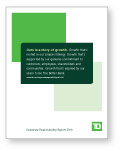Lending, Credit and Project Financing
-
- Lending, Credit and Project Financing
- Performance
-
TD’s Environmental & Social Risk Policy for Non-Retail Credit Business Lines establishes common standards for identification and management of environmental and social risk across non-retail lending operations, including due diligence requirements. The policy applies to general corporate purpose, project and fixed-asset financing. Within the Wholesale Bank, the policy is implemented through the following approach:
Environmental and Social Credit Risk Process
Step 1
High-Level Screen
A high-level screen is applied against all borrowing accounts to identify any activities that are prohibited under TD’s Environmental Management Framework.
Step 2
Social and Environmental Assessment (SEA)
This step assesses a client’s commitment, capacity and track record based on regulatory issues and other material environmental risks, stakeholder engagement and, where applicable, issues relating to free prior and informed consent of Aboriginal Peoples.
Step 3
Equator Principles Categorization Tool
This tool is applied where a project or fixed asset is being financed.
Step 4
Sector-Specific Due Diligence Guides
Guides have been developed for environmentally sensitive sectors.
TD’s Environment team maintains tools and resources to support credit risk managers.Step 5
Escalation
If an application scores high for environmental sensitivity, TD Environment help assess if any action can be taken to reduce the environmental or social risk.
In cases where risk remains high the escalation process moves through Credit Risk Management and may proceed ultimately to TD’s Reputational Risk Committee.
This process is designed to ensure that environmental and social risk is proactively managed across TD; a scaled-down version is applied to most other TD businesses involved in credit and lending. All clients and projects are screened for adequacy of environmental and social policies, management systems and performance.
Equator Principles
TD has been a signatory to the Equator Principles since 2007. We’ve incorporated the Equator Principles within our Social and Environmental Credit Risk Policy.
Find out more about the Equator Principles.
-
Carbon Sensitivity
While there is currently no federal legislation in North America relating to carbon emissions, we have identified potential business risk associated with high levels of carbon emissions. This risk occurs through exposure to future federal regulations, state or provincial regulations, energy or electricity costs and reputational risk. We have assessed the carbon sensitivity of our lending portfolio, by sector.
- Sectors that rate high for carbon sensitivity include: automotive, chemical, pipelines, oil and gas, power and utilities.
- Sectors that rate moderate for carbon sensitivity include agriculture, construction, food and beverage, forestry, manufacturing, metals and mining, and transportation.
Carbon Sensitivity of TD’s Lending/Credit Portfolio
2010 2009 Low (%) 91.5 89.1 Moderate (%) 5.3 6.4 High (%) 3.2 4.5 Total Lending ($ millions) 267,352 264,844
TD continues to have low overall exposure to high-carbon emitting industries. We also saw an increase of 100% in our Cleantech lending book, between 2009 and 2010. This increase is largely due to more investment in renewable energy by integrated energy companies.
Environmental and Social Risk Assessment
The following North American projects were reviewed according to the Equator Principles.
2010 2009 2009 Equator Principles Category A 0 0 0 Equator Principles Category B 2 1 7 Equator Principles Category C 3 0 4 Total Projects 5 1 11
In addition to the Equator Principles review, four potential financing deals were escalated to TD Environment through the credit risk process. These deals were in the power generation and mining sectors.
Risk Mitigation 2010 Number of escalated financing deals reviewed by TD Environment 4


